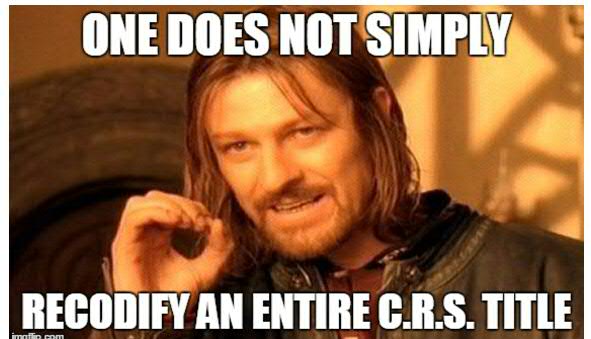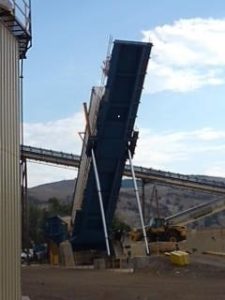Since July, several legislative interim study committees met to hear testimony from experts and discuss policy issues that the Legislative Council prioritized for study last spring. On Monday, October 15, the Legislative Council met to consider the bills recommended to them by these study committees. This week and next we will provide a summary of those bills that the Legislative Council approved.
Before summarizing bills, we note that of the 13 prioritized committees, one – the Legislative Interim Committee on School Finance – is exempted by statute from the requirement to obtain approval of the Legislative Council to introduce its bills; and the Legislative Interim Workplace Study Committee must submit its recommendations to the Executive Committee. Accordingly, these committees met, but neither of them recommended bills to the Legislative Council.
Alternatives to the Gallagher Amendment Interim Study Committee
The Alternatives to the Gallagher Amendment Interim Study Committee met a total of five times over the 2018 interim, including one meeting in Glenwood Springs and one meeting in Pueblo. The committee had discussions with representatives of local fire, library, and water districts and county commissioners, as well as heard public testimony from the state’s small business community, regarding the impact of the Gallagher Amendment and the financial burden experienced as a result.
At its final hearing on October 3, 2018, the committee considered seven bills and recommended three of them to the Legislative Council. At the Legislative Council meeting on October 15, 2018, the Council voted to introduce Bill B only:
Bill B: Concerning the establishment of regional residential assessment rates.
In response to contrasting residential property values across the state, the bill establishes eight regions in the state (according to the regions managed by the regional offices within the division of local government in the department of local affairs as of January 1, 2019) that the property tax administrator is then required to determine the residential assessment rate for, as opposed to the state-wide residential assessment rate currently required by law.
To review the bills recommended by the Alternatives to the Gallagher Amendment Interim Study Committee, including those not approved by the Legislative Council, please visit the committee’s website. For questions concerning the legislation, please contact Ed DeCecco.
Water Resources Review Committee
The Water Resources Review Committee met six times during the 2018 interim. At the September 27, 2018, meeting, the committee considered and voted on five bill drafts and two joint memorial drafts that committee members requested in August. Pursuant to section 37-98-103 (1), C.R.S., a two-thirds majority of the Water Resources Review Committee members must vote to report a bill draft to the Legislative Council. Although the committee voted to report both of the joint memorial drafts to the Legislative Council, only two of the five bill drafts were approved by the necessary two-thirds majority of the committee.
Bill A: Concerning the Republican river water conservation district, and, in connection therewith, expanding the boundaries of the district and adjusting the meeting schedule of the district’s board of directors.
The boundaries of the Republican river water conservation district are currently established by statute as certain counties and portions of counties that are within the Republican river basin. The bill expands the boundaries by including in the district areas where groundwater pumping depletes the flow of the Republican river as contemplated by applicable United States Supreme Court case law. The composition of the district’s board of directors is adjusted accordingly. Current law requires the Republican river water conservation district board of directors to conduct regular quarterly meetings in January, April, July, and October. The bill changes these months to February, May, August, and November.
Bill B: Concerning the methodology to distribute money in the severance tax operational fund after core departmental programs are funded without changing the transfers to the natural resources and energy grant programs.
Money in the severance tax operational fund (operational fund) is primarily used for two purposes. The general assembly annually appropriates money from the operational fund for several core departmental programs, which were previously described as “tier-one programs”. If money remains after these appropriations and after a reserve requirement for the core departmental programs is satisfied, then the state treasurer transfers money to an array of funds that support natural resources and energy grant programs, which were previously described as “tier-two programs”. There is also a requirement that the reserve include an amount equal to 15% of the maximum transfers to natural resources and energy grant programs required by law, and this reserve is used for the transfers, if necessary. The bill changes the distribution of the money in the operational fund as follows:
- Separates the reserve into the core reserve and the grant program reserve, while maintaining the overall purpose of each reserve;
- Increases the maximum grant program reserve to 100% of the maximum transfers to the natural resources and energy grant programs required by law, which currently is equal to $36,378,072;
- Requires the state treasurer to make the transfers to the natural resources and energy grant programs on August 15 after a fiscal year and to base the transfers on actual revenue as opposed to estimated revenue. Money from the grant program reserve may be used for these transfers; and
- If all of the appropriations and transfers have been made and both reserves are full, then the state treasurer is required to transfer any money remaining in the operational fund to the severance tax perpetual base fund.
Joint Memorial A: Concerning memorializing the United States Congress to fulfill the commitment of the federal government to provide funding for the Arkansas Valley Conduit project.
This Senate joint memorial asks the United States Congress to fulfill its commitment to provide funding for the Arkansas Valley Conduit project, which was authorized by Congress as part of the Fryingpan-Arkansas Project in 1962 as a means to address water quality and availability issues in the Arkansas River basin east of Pueblo but was never built, largely because of the inability of participants to repay construction costs.
Joint Memorial B: Concerning memorializing the United States Congress to enact legislation directing the United States Army Corps of Engineers, in conjunction and cooperation with the Lower Arkansas Valley Water Conservancy District, to dredge a portion of the Arkansas River.
This Senate joint memorial asks the United States Congress to immediately enact legislation that directs the United States Army Corps of Engineers, in conjunction and cooperation with the Lower Arkansas Valley Water Conservancy District, to dredge a portion of the Lower Arkansas River from below the Fort Lyons diversion to the John Martin Reservoir, including a “pinch point” through which the river passes as it traverses between the towns of La Junta, on the south bank, and North La Junta, on the north bank.
To review the bills and memorials recommended by the Water Resources Review Committee, please visit the committee’s website. For questions concerning the legislation, please contact Thomas Morris, Jennifer Berman, or Richard Sweetman.
Wildfire Matters Review Committee
The Wildfire Matters Review Committee held four hearings during the 2018 legislative interim. During these hearings, the committee heard from public and private agencies and organizations on the front lines of wildfire prevention and mitigation in Colorado, including the Division of Fire Prevention and Control within the Department of Public Safety, the United States Forest Service, the Colorado State Forest Service (CSFS), the Colorado Division of Insurance, public utilities, the Colorado State Fire Chiefs, and the Colorado Sheriff’s Association. Over the course of its hearings, the committee heard presentations on such topics as the use of drones in fire suppression, the role of forest management in mitigating wildfire risk, the condition of the state’s timber industry, incentives from insurers and local governments to assist in fire mitigation efforts, the effects of the Gallagher Amendment on local fire-fighting resources, the efforts of utilities to make their systems more resistant to natural disasters, and partnerships the CSFS has entered into with other stakeholders to improve wildfire fighting and mitigation efforts.
At its final meeting, the committee voted to recommend four bills to the Legislative Council, three of which were approved.
Bill A: Concerning development of a system to patrol the airspace above wildland fires.
This bill requires the center of excellence for advanced technology aerial firefighting, subject to available appropriations, to study and, if feasible, implement a system to patrol the airspace above a wildland fire.
Bill B: Concerning measures to mitigate the effects of wildfires within wildland-urban interface areas, and, in connection therewith, creating a state grant program to promote forest management fuels reduction projects in such areas.
This bill creates a state grant program that the CSFS will administer to fund proactive forest management fuels reduction projects to reduce the impacts to life, property, and critical infrastructure caused by wildfires. Groups of individual landowners whose land is in an area covered by a community wildfire protection plan are eligible to apply for a grant award. The bill specifies requirements pertaining to the evaluation of grant proposals. The CSFS must select the proposals that will receive funding, administer the grant program, and develop procedures by which applicants will apply for grants. The bill imposes a monetary limit on the amount of a grant and requires a grant applicant to demonstrate an available amount of matching funds to be awarded a grant. The bill requires the CSFS to report annually to the general assembly on the number, location, and benefits of all projects for which a grant award is made.
Bill D: Concerning the power of a county to restrict the use of fireworks during the period between May 31 and July 5 of any year.
Under current law, a county may prohibit or restrict by ordinance the sale, use, and possession of fireworks, including permissible fireworks (fireworks restrictions), for a period that does not exceed one year in length within all or any part of the unincorporated areas of the county; except that the county may not have such an ordinance in effect between May 31 and July 5 of any year unless the ordinance includes an express finding of high fire danger, based on competent evidence. The bill specifies that such an ordinance is in effect for the period between May 31 and July 5 of any year only if the county adopts by resolution such fireworks restrictions for such period, which resolution includes an express finding of high fire danger, based on competent evidence.
The bill also adds as a source of competent evidence justifying a finding of high fire danger predictions of future fire danger such as those issued by the national interagency coordination center or any successor entity.
To review the bills and memorials recommended by the Wildfire Matters Review Committee, please visit the committee’s website. For questions concerning the legislation, please contact Bob Lackner or Megan Waples.
Opioid and Other Substance Use Disorders Study Committee
The Opioid and Other Substance Use Disorders Study Committee met five times over the interim and heard from state agencies and officials and stakeholders representing all aspects of the substance use disorder crisis. The committee also held several stakeholder meetings to discuss potential legislation. The committee requested the drafting of five bills and voted to advance all five bills to Legislative Council. Of the five bills recommended, the Legislative Council approved two:
Bill B: Concerning supports for persons recovering from substance use disorders, and, in connection therewith, expanding a program in the department of local affairs that provides vouchers for housing assistance to certain individuals, requiring each recovery residence operating in Colorado to be licensed by the department of public health and environment, and creating the opioid crisis recovery fund.
The bill:
- Expands the housing voucher program currently within the department of local affairs to include individuals with a substance use disorder and appropriates $4.3 million each of the next 5 fiscal years to support the program;
- Requires each recovery residence operating in Colorado to be licensed by the department of public health and environment; and
- Creates the opioid crisis recovery fund for money the state receives as settlement or damage awards resulting from opioid-related litigation.
Bill E: Concerning treatment of individuals with substance use disorders who come into contact with the criminal justice system, and, in connection therewith, making an appropriation.
The bill:
- Requires the Colorado commission on criminal and juvenile justice to study and make recommendations concerning:
- Alternatives to filing criminal charges against individuals with substance use disorders who have been arrested for drug-related offenses;
- Best practices for investigating unlawful opioid distribution in Colorado; and
- A process for automatically sealing criminal records for drug offense convictions.
- Requires the department of corrections (DOC) to allow medication-assisted treatment to be provided to persons who were receiving treatment in a local jail prior to being transferred to the custody of the DOC. The DOC may enter into agreements with community agencies and organizations to assist in the development and administration of medication-assisted treatment.
- Contains a legislative declaration that the substance abuse trend and response task force should formulate a response to current and emerging substance abuse problems from the criminal justice, prevention, and treatment sectors that includes the use of drop-off treatment services, mobile and walk-in crisis centers, and withdrawal management programs as an alternative to entry into the criminal justice system for offenders of low-level drug offenses.
- Directs the department of health care policy and financing to seek federal authorization under the Medicaid program for treatment of substance use disorders for persons confined in jails.
- Creates a simplified process for sealing convictions for level 4 drug felonies, all drug misdemeanors, and any offense committed prior to October 1, 2013, that would have been a level 4 drug felony or drug misdemeanor if committed on or after October 1, 2013. A defendant may file a motion to seal records three years or more after final disposition of the criminal proceedings. Conviction records may be sealed only after a hearing and upon court order.
- Requires jails that receive funding through the jail-based behavioral health services program to allow medication-assisted treatment to be provided to individuals in the jail. The jail may enter into agreements with community agencies and organizations to assist in the development and administration of medication-assisted treatment.
- Provides an appropriation, including for the following programs funded through the annual long appropriations act:
- Increasing from four to 10 the number of the law-enforcement-assisted diversion pilot programs; and increasing corresponding funding for criminal justice diversion pilot programs in the office of behavioral health in the department of human services.
To review the bills and memorials recommended by the Opioid and Other Substance Use Disorders Study Committee, please visit the committee’s website. For questions concerning the legislation, please contact Kristen Forrestal, Yelana Love, or Brita Darling.
 Executive department agencies, the judicial branch, interested Colorado residents, and nonpartisan staff from a number of agencies in and around the Capitol, as well as legislators themselves, have brought issues for the SRC to consider. Initially, staff considers these requests and whether they fall within the charge of the SRC and then prepares a memo detailing the requested change, often with a bill draft attached for the SRC to consider.
Executive department agencies, the judicial branch, interested Colorado residents, and nonpartisan staff from a number of agencies in and around the Capitol, as well as legislators themselves, have brought issues for the SRC to consider. Initially, staff considers these requests and whether they fall within the charge of the SRC and then prepares a memo detailing the requested change, often with a bill draft attached for the SRC to consider.







